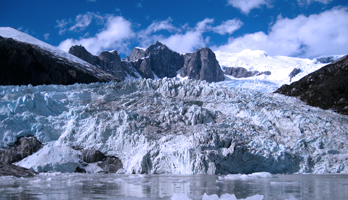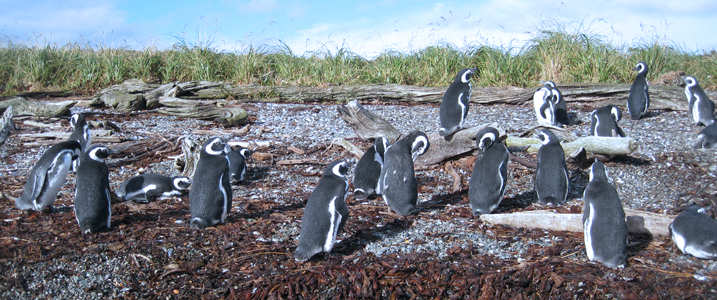

Reception at Punta Arenas airport by your guide and transfer to Torres del Paine National Park, declared Biosphere Reserve by UNESCO in 1978. In the language Tehuelche, Paine means “navy blue”, colour of the lakes and glaciers. The park is a real paradise for the lovers of the fauna, of the flora and of the big wild spaces …. It is possible to observe, among others, the most important group of condors of South America.
Full day excursion in the park. We visit the Lake Grey sector to watch the huge ice blocks falling from the glacier into the lake (approximately 1 hour hike). Afterwards we visit the Administration Centre of the Park. Possibility to hike to the viewpoint Nordenskjold (approximately 1 hour and a half) from where we have an amazing view of the ”Horns of Paine” and Lake Nordenskjold. It is also possible to visit the Paine waterfall.
Transfer to the Argentinean town of El Calafate. Its name derives from the small bush of calafate, typical of the south of Patagonia. The fruit is a very tasty berry used in cakes and pastry. According to the legend, those who eat calafate once, will come back for more. Actually, those who stay in Calafate wish not to leave. Free time to visit the town on your own.
Excursion to the magnificent Perito Moreno Glacier. It is one of the few glaciers in the world that are not retreating. This impressive ice formation, located in “Los Glaciares” National Park, is 5 km wide and even more than 60 high. We will see huge ice blocks falling from the glacier into the Lake Argentino with a deafening noise and big waves. It is a memorable spectacle. Return to Calafate.
Transfer to the airport of El Calafate to take the flight to Ushuaia. Reception by your guide and transfer to the hotel. Afterwards, excursion to Tierra del Fuego National Park and the sector of Lapataia. In this humid zone the flora is abundant: we will see Canelo, Leñadura, Notro, Lenga, Ñire and Guindo trees as well as numerous flowers, especially during the summer. The park provides a rich habitat for 90 species of birds, including carancas, torrent ducks, austral parakeets, condors and oystercatchers.

Free morning to discover the city by your own. Afterwards, transfer to the office of Cruceros Australis to do the check-in (between 10:00 hs and 16:00 hs). Board at 17:30 hs. After a welcoming cocktail reception hosted by the captain and his crew, the ship departs for one of the most remote corners of planet Earth. During the night we traverse the Beagle Channel and cross from Argentine into Chilean territorial waters. Overnight on BOARD.
By early morning, Via Australis is cruising across Nassau Bay into the remote archipelago that includes Cape Horn National Park. Weather and sea conditions permitting, we shall go ashore on the windswept island that harbors legendary Cape Horn (Cabo de Hornos). Discovered in 1616 by a Dutch maritime expedition — and named after the town of Hoorn in West Friesland — Cape Horn is a sheer 425-meter (1,394-foot) high rocky promontory overlooking the turbulent waters of the Drake Passage. For many years it was the only navigation route between the Pacific and Atlantic, and was often referred to as the “End of the Earth.” The park was declared a World Biosphere Reserve by UNESCO in 2005. In the afternoon we anchor at fabled Wulaia Bay. Originally the site of one of the region’s largest Yámana aboriginal settlements, the bay was described by Charles Darwin and sketched by Captain Fitz Roy in the 1830s during their voyages on the HMS Beagle. This area is also renowned for its mesmerizing beauty and dramatic geography. You will be strolling through an enchanted Magellan forest of lengas, coigües, canelos, ferns, and other endemic fauna to reach a panoramic viewpoint overlooking the bay.
After nightfall we reenter the Beagle Channel and sail westward along the southern edge of Tierra del Fuego into a watery wonderland protected within the confines of Alberto de Agostini National Park. We then navigate a zigzag route through the Cockburn Channel, Magdalena Channel and Keats Fjord to reach scenic De Agostini Sound. It is flanked by numerous glaciers and sheer saw-toothed peaks reminiscent of Torres del Paine. Our shore excursion this day is Águila (“Eagle”) Glacier, which hovers above a placid glacial lagoon surrounded by primeval forest. After a Zodiac landing on the beach, passengers hike around the edge of the lagoon to a spot near the base of the frozen facade. Condors can sometimes be seen winging high above, but there is always abundant bird life around the lagoon. This landing provides the perfect opportunity to experience the beauty of Patagonia’s sub-Antarctic rainforest and to see how the power of nature has molded the spectacular landscape.
After an overnight cruise that takes us back into the Strait of Magellan, we anchor off Magdalena Island, which lies about halfway between Tierra del Fuego and the Chilean mainland. Crowned by a distinctive lighthouse, the island used to be an essential source of supplies for navigators and explorers and is inhabited by an immense colony of Magellanic penguins. At the break of dawn, weather permitting, we go ashore and hike a path that leads through thousands of penguins to a small museum lodged inside the vintage 1902 lighthouse. Many other bird species are also found on the island. In September and April — when the penguins dwell elsewhere — this excursion is replaced by a ride aboard Zodiacs to Marta Island to observe South American sea lions. After a short sail south along the strait, disembarkation at Punta Arenas is scheduled for around 11:30 AM. Arrival and transfer to the airport of Punta Arenas to take our flight back.